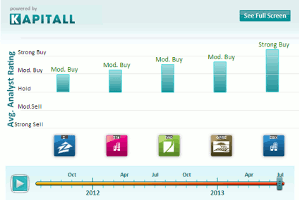Short selling, in addition to driving down a stock’s price by creating negative speculation about a company's wellbeing, can also paradoxically make a stock more valuable, writes James Dennin on Kapitall.com.
Short selling is an interesting facet of the market, in part because it is the only kind of securities trade where anything can be assumed with certainty. Unfortunately it doesn't regard a stock's price, profitability, or the likelihood that either will go up or down. However, a trader can be completely sure that stocks that have been shorted must be covered.
What does that mean for potential investors? Short selling occurs when an investor borrows and sells shares of a stock, which he or she believes will go down. If the stock price does indeed decline, then he can buy back the shares at a reduced price and return them to the person he borrowed them from. The difference in the two prices goes into the pocket of the person who short-sold the stock. There is no mandatory timeline on when the seller must buy back the shorted stock—however if the price begins to rise he may have to buy to cover, or purchase back the shares before they hit their original price.
To create the list below, we ran a screen on stocks that are experiencing short increases, and focused our analysis on stocks that have experienced at least a 1% spike in short-sold shares during the last month. To look for stocks that might be on the rise, we cross-referenced this search to include stocks that have experienced long-term-growth over the last five years.
Are the markets correct or are these prices likely to bounce back? Use the charts below to begin your own analysis.
1. Ebix Inc. (EBIX): Provides on-demand software and e-commerce solutions to the insurance industry. Market cap at $413.68M, most recent closing price at $11.55. Sales growth in the past five years: 36.00%.
2. Green Plains Renewable Energy, Inc. (GPRE): Engages in the production, marketing, and distribution of ethanol and related distillers grains in the United States. Market cap at $525.02M, most recent closing price at $18.02. Sales growth in the past five years: 170.10%.
3. Titan Machinery, Inc. (TITN): Operates a network of full service agricultural and construction equipment stores in the United States. Market cap at $434.39M, most recent closing price at $19.50. Sales growth in the past five years: 38.40%.
4. Two Harbors Investment Corp. (TWO): Operates as a real estate investment trust (REIT) that focuses on residential mortgage-backed securities and related investments. Market cap at $3.09B, most recent closing price at $10.99. Sales growth in the past five years: 213.60%.
5. Zillow, Inc. (Z): Operates an online real estate information marketplace. Market cap at $2.46B, most recent closing price at $74.61. Sales growth in past five years: 75.1%.
You can asses the risk of a short sale by looking at the days to cover ratio, which is a measurement of the ratio between a company's shares that are currently being shorted against its average daily float. Short selling, in addition to driving down a price by creating negative speculation about a company's wellbeing, can also paradoxically make a stock more valuable. This happens when a stock becomes too shorted, and sellers simultaneously try to cover their borrowed shares. This can create a spike in demand that accidently drives up the price. This is called a short squeeze. A higher days-to-cover ratio increases the possibility of this happening.
By James Dennin of Kapitall.com












